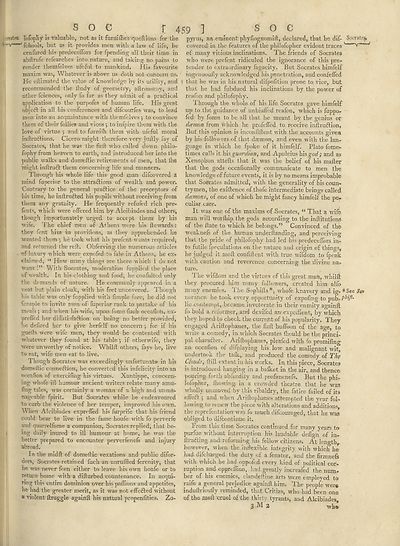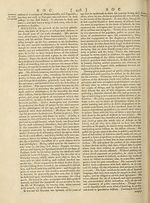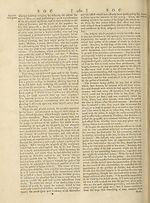Encyclopaedia Britannica, or, a Dictionary of arts, sciences, and miscellaneous literature : enlarged and improved. Illustrated with nearly six hundred engravings > Volume 19, Scripture-SUG
(505) Page 459
Download files
Complete book:
Individual page:
Thumbnail gallery: Grid view | List view

s O C r 459 ] S O €
:rates. lofopliy is valuable, not as it furniflies queflions for tlie
"V ' fchools, but as it provides men with a law of life, he
cenfured his predeceffors for fpending all their time in
abilrufe refearches into nature, and taking no pains to
render theiofelves ufcftil to mankind. His favourite
maxim was, Whatever is above us doth not concern us-.
He eflimated the value of knowledge by its utility, and
recommended the ftudy of geometry, aftronomy, and
other fcienees, only fo far as they admit of a practical
application to the purpofes of human life. His great
object in all his conferences and difeourfes was, to lead
men into an acquaintance with themfelves ; to convince
them of their follies and vices *, to infpire them with the
love of virtue ; and to furnifh them with ufeful moral
inftruihions. Cicero might therefore very juilly fay of
Socrates, that he was the firlt who called down philo-
fophy from heaven to earth, and introduced her into the
public walks and domeftic retirements of men, that fire
might inftrufl them concerning life and manners.
Through his whole life this good man difeovered a
mind fuperior to the attraftions of wealth and power.
Contrary to the general praftice of the preceptors of
his time, he inftrufted his pupils without receiving from
them any gratuity. He frequently refufed rich pre¬
fects, which -were offered him by Alcibiades and others,
though importunately urged to accept them by his
wife. 'The chief men of Athens were his ftewards :
they fent him in prdvifions, as they apprehended he
wanted them *, he took what his prefect wants required,
and returned the reft. Obferving the numerous articles
of luxury which were expofed to fale in Athens, he ex¬
claimed, “ Howt many things are there which 1 do not
want 1” With Socrates, moderation fupplied the place
of wealth. In his clothing and food, he confulted only
the demands of nature. He commonly appeared in a
heat but plain cloak, with his feet uncovered. Though
his table was only fupplied with lira-pie fare, he did not
fcruple to invite men of fuperior rank to partake of his
meals ; and when his wife, upon fome fueh occafioh, ex-
prefled her diflatisfadfion on being no better provided,
he deflred her to give herfelf no concern •, for if his
guefts were wife men, they would be contented with
whatever they found at his table •, if otherwife, they
were unworthy of notice. Whilft others, fays he, live
to eat, wife men eat to live.
Though Socrates was exceedingly unfortunate in his
domeftic connexion, he converted this infelicity into an
oecafion of exerciling his virtues. Xantippe, concern¬
ing whofe ill humour ancient writers relate many amu-
iing tales, was certainly a woman of a high and unma¬
nageable fpirit. But Socrates while he endeavoured
to curb the violence of her temper, improved his own.
When Alcibiades expreffed his furprife that his friend
could bear to live in the fame houfe with fo perverfe
and quarrelfome a companion, Socrates replied, that be¬
ing daily inured to ill humour at home, he was the
better prepared to encounter perverfenefs and injury
abroad.
In the midft of domeftic vexations and public difor-
ders, Socrates retained fuch an unruffled ferenity, that
he was never feen either to leave his own houfe or to
return home with a difturbed countenance. In acqui¬
ring this entire dominion over his paflions and appetites,
he had the greater merit, as it was not effe&ed without
a violent ftruggle againft his natural propenfities. Zo-
pyrus, an eminent phyliognomift, declared, that he dif- Socrates,
covered in the features of the philofopher evident traces -rr v *J—J
of many vicious inclinations. The friends of Socrates
who were prefent ridiculed the ignorance of this pre¬
tender to extraordinary fagacity. But Socrates himfelf
ingenuouily acknowledged his penetration, and confefled
that he was in his natural difpofition prone to vice, but
that he had fubdued his inclinations by the power of
reafon and philofophy.
Through the whole of his life Socrates gave himfelf
up to the guidance of unbiafied reafon, which is fuppo-
fed by fome to be all that he meant by the genius or
deemon from which he profeffed to receive inftrudtion.
But this opinion is inconfiftent with the accounts given
by liis followers of that daemon, and even with the Ian-
guage in which he fpoke of it himfelf. Plato fome-
times calls it his guardian, and Apuleius his^or/; and as
Xenophon attefts that it was the belief of his mailer
that the gods occafionally communicate to men the
knowledge of future events, it is by no means improbable
that Socrates admitted, with the generality of his coun¬
trymen, the exiftence of thofe intermediate beings called
dcvmons, of one of which he might fancy himfelf the pe¬
culiar care.
It was one of the maxims of Socrates, “ That a wife
man will worftiip the gods according to the inftitutions
of the ftate to which he belongs.” Convinced of the
weaknefs of the human underftanding, and perceiving
that the pride of philofophy had led his predeceffors in¬
to futile {peculations on the nature and origin of things,
he judged it moft conftftent with true wifdom to fpeak
with caution and reverence concerning the divine na¬
ture.
The wifdom and the virtues of this great man, whilft
they procured him many followers, created him aifo
many enemies. J he Sophifts*, whofe knavery and ig-*See So*
nornnee he took every opportunity of expofing to pub-^i/7-
lie contempt, became inveterate in their enmity againft
fo bold a reformer, and deviled an expedient, by which
they hoped to check the current of his popularity. They
engaged Ariftophanes, the firft buffoon of the age, to
write a comedy, in which Socrates ftiould be the princi¬
pal character. Ariftophanes, pleafed with fo promifmg
an occafion of difplaying his low and malignant wit,
undertook the talk, and produced the comedy of The
Clouds, ftill extant in his works. In this piece, Socrates
is introduced hanging in a balket in the air, and thence
pouring, forth abfurdity and profanenefs. But the phi¬
lofopher, Ihowing in a crowded theatre that he was
wholly unmoved by this ribaldry, the fatire failed of its
effeft ; and xvhen Ariftophanes attempted the year fol¬
lowing to renew the piece with alterations and additions,
the reprefenlaiion was fo much difeouraged, that he was
obliged to difeontinue it.
From this time Socrates continued for many years to
purfue without interruption his laudable delign of in-
ftrudling and reforming his fellow citizens. At length,
however, when the inflexible integrity with which he
had. difeharged the duty of a fenator, and the firmnefs
with which he had oppofed every kind of political cor¬
ruption and oppreffion, had greatly increafed the num¬
ber of his enemies, clandeftine arts were employed to
raife a general prejudice againft him* The people wer#
induftrioufly reminded, that Critias, who had been one
of the moft cruel ofihe thirty tyrants, and Alcibiades,
$ NL 2 who
:rates. lofopliy is valuable, not as it furniflies queflions for tlie
"V ' fchools, but as it provides men with a law of life, he
cenfured his predeceffors for fpending all their time in
abilrufe refearches into nature, and taking no pains to
render theiofelves ufcftil to mankind. His favourite
maxim was, Whatever is above us doth not concern us-.
He eflimated the value of knowledge by its utility, and
recommended the ftudy of geometry, aftronomy, and
other fcienees, only fo far as they admit of a practical
application to the purpofes of human life. His great
object in all his conferences and difeourfes was, to lead
men into an acquaintance with themfelves ; to convince
them of their follies and vices *, to infpire them with the
love of virtue ; and to furnifh them with ufeful moral
inftruihions. Cicero might therefore very juilly fay of
Socrates, that he was the firlt who called down philo-
fophy from heaven to earth, and introduced her into the
public walks and domeftic retirements of men, that fire
might inftrufl them concerning life and manners.
Through his whole life this good man difeovered a
mind fuperior to the attraftions of wealth and power.
Contrary to the general praftice of the preceptors of
his time, he inftrufted his pupils without receiving from
them any gratuity. He frequently refufed rich pre¬
fects, which -were offered him by Alcibiades and others,
though importunately urged to accept them by his
wife. 'The chief men of Athens were his ftewards :
they fent him in prdvifions, as they apprehended he
wanted them *, he took what his prefect wants required,
and returned the reft. Obferving the numerous articles
of luxury which were expofed to fale in Athens, he ex¬
claimed, “ Howt many things are there which 1 do not
want 1” With Socrates, moderation fupplied the place
of wealth. In his clothing and food, he confulted only
the demands of nature. He commonly appeared in a
heat but plain cloak, with his feet uncovered. Though
his table was only fupplied with lira-pie fare, he did not
fcruple to invite men of fuperior rank to partake of his
meals ; and when his wife, upon fome fueh occafioh, ex-
prefled her diflatisfadfion on being no better provided,
he deflred her to give herfelf no concern •, for if his
guefts were wife men, they would be contented with
whatever they found at his table •, if otherwife, they
were unworthy of notice. Whilft others, fays he, live
to eat, wife men eat to live.
Though Socrates was exceedingly unfortunate in his
domeftic connexion, he converted this infelicity into an
oecafion of exerciling his virtues. Xantippe, concern¬
ing whofe ill humour ancient writers relate many amu-
iing tales, was certainly a woman of a high and unma¬
nageable fpirit. But Socrates while he endeavoured
to curb the violence of her temper, improved his own.
When Alcibiades expreffed his furprife that his friend
could bear to live in the fame houfe with fo perverfe
and quarrelfome a companion, Socrates replied, that be¬
ing daily inured to ill humour at home, he was the
better prepared to encounter perverfenefs and injury
abroad.
In the midft of domeftic vexations and public difor-
ders, Socrates retained fuch an unruffled ferenity, that
he was never feen either to leave his own houfe or to
return home with a difturbed countenance. In acqui¬
ring this entire dominion over his paflions and appetites,
he had the greater merit, as it was not effe&ed without
a violent ftruggle againft his natural propenfities. Zo-
pyrus, an eminent phyliognomift, declared, that he dif- Socrates,
covered in the features of the philofopher evident traces -rr v *J—J
of many vicious inclinations. The friends of Socrates
who were prefent ridiculed the ignorance of this pre¬
tender to extraordinary fagacity. But Socrates himfelf
ingenuouily acknowledged his penetration, and confefled
that he was in his natural difpofition prone to vice, but
that he had fubdued his inclinations by the power of
reafon and philofophy.
Through the whole of his life Socrates gave himfelf
up to the guidance of unbiafied reafon, which is fuppo-
fed by fome to be all that he meant by the genius or
deemon from which he profeffed to receive inftrudtion.
But this opinion is inconfiftent with the accounts given
by liis followers of that daemon, and even with the Ian-
guage in which he fpoke of it himfelf. Plato fome-
times calls it his guardian, and Apuleius his^or/; and as
Xenophon attefts that it was the belief of his mailer
that the gods occafionally communicate to men the
knowledge of future events, it is by no means improbable
that Socrates admitted, with the generality of his coun¬
trymen, the exiftence of thofe intermediate beings called
dcvmons, of one of which he might fancy himfelf the pe¬
culiar care.
It was one of the maxims of Socrates, “ That a wife
man will worftiip the gods according to the inftitutions
of the ftate to which he belongs.” Convinced of the
weaknefs of the human underftanding, and perceiving
that the pride of philofophy had led his predeceffors in¬
to futile {peculations on the nature and origin of things,
he judged it moft conftftent with true wifdom to fpeak
with caution and reverence concerning the divine na¬
ture.
The wifdom and the virtues of this great man, whilft
they procured him many followers, created him aifo
many enemies. J he Sophifts*, whofe knavery and ig-*See So*
nornnee he took every opportunity of expofing to pub-^i/7-
lie contempt, became inveterate in their enmity againft
fo bold a reformer, and deviled an expedient, by which
they hoped to check the current of his popularity. They
engaged Ariftophanes, the firft buffoon of the age, to
write a comedy, in which Socrates ftiould be the princi¬
pal character. Ariftophanes, pleafed with fo promifmg
an occafion of difplaying his low and malignant wit,
undertook the talk, and produced the comedy of The
Clouds, ftill extant in his works. In this piece, Socrates
is introduced hanging in a balket in the air, and thence
pouring, forth abfurdity and profanenefs. But the phi¬
lofopher, Ihowing in a crowded theatre that he was
wholly unmoved by this ribaldry, the fatire failed of its
effeft ; and xvhen Ariftophanes attempted the year fol¬
lowing to renew the piece with alterations and additions,
the reprefenlaiion was fo much difeouraged, that he was
obliged to difeontinue it.
From this time Socrates continued for many years to
purfue without interruption his laudable delign of in-
ftrudling and reforming his fellow citizens. At length,
however, when the inflexible integrity with which he
had. difeharged the duty of a fenator, and the firmnefs
with which he had oppofed every kind of political cor¬
ruption and oppreffion, had greatly increafed the num¬
ber of his enemies, clandeftine arts were employed to
raife a general prejudice againft him* The people wer#
induftrioufly reminded, that Critias, who had been one
of the moft cruel ofihe thirty tyrants, and Alcibiades,
$ NL 2 who
Set display mode to:
![]() Universal Viewer |
Universal Viewer | ![]() Mirador |
Large image | Transcription
Mirador |
Large image | Transcription
Images and transcriptions on this page, including medium image downloads, may be used under the Creative Commons Attribution 4.0 International Licence unless otherwise stated. ![]()
| Permanent URL | https://digital.nls.uk/192701847 |
|---|
| Attribution and copyright: |
|
|---|
| Description | Ten editions of 'Encyclopaedia Britannica', issued from 1768-1903, in 231 volumes. Originally issued in 100 weekly parts (3 volumes) between 1768 and 1771 by publishers: Colin Macfarquhar and Andrew Bell (Edinburgh); editor: William Smellie: engraver: Andrew Bell. Expanded editions in the 19th century featured more volumes and contributions from leading experts in their fields. Managed and published in Edinburgh up to the 9th edition (25 volumes, from 1875-1889); the 10th edition (1902-1903) re-issued the 9th edition, with 11 supplementary volumes. |
|---|---|
| Additional NLS resources: |
|

